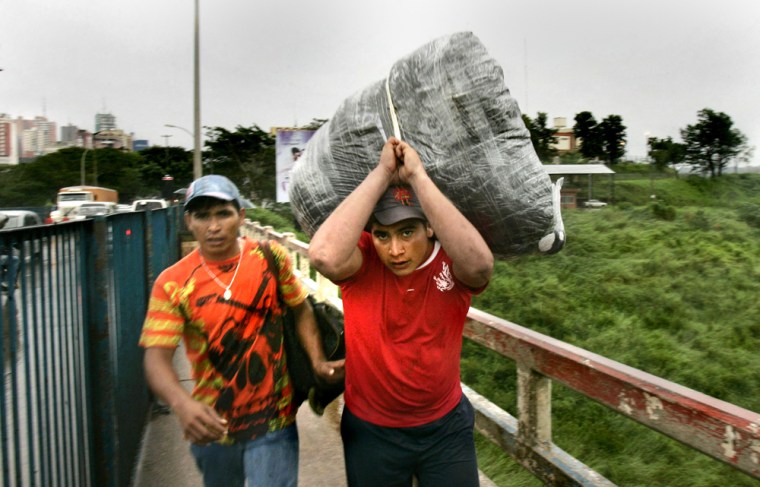Men lugging shiny stereos, new tires and heavy bundles on their backs stream like ants across the Friendship Bridge, where smugglers lower contraband from Paraguay on ropes to Brazilian runners on the riverbank below.
No one checks passports and anyone asking questions is hustled away in this smugglers’ haven near the “Triple Border,” where Paraguay, Brazil and Argentina meet — and where contraband electronics, toys, drugs and arms flow across porous borders.
Paraguayan President Nicanor Duarte and Brazil’s Luiz Inacio Lula da Silva met in Paraguay’s capital, Asuncion, on Monday and vowed to boost legitimate trade and to strengthen cross-border cooperation in fighting smuggling in the Triple Border. They also signed a pledge to build another bridge on the Parana River separating their countries.
But neither broached one thorny issue: a wall Brazil had planned to build on its side of the Friendship Bridge to combat contraband and smuggling. When announced in March, Duarte called the wall a “shameful” proposal. Silva’s office said ahead of his visit that no wall will be built, but did not say why the wall was scrapped.
“Convergence, not divergence, is the solution to our problems,” Silva said Monday, sounding conciliatory as he talked of boosting bilateral trade, which Brazil’s foreign ministry said totaled $1.5 billion in 2006.
Both leaders said greater trade would help the poor in both countries. Paraguay is South America’s poorest country after Bolivia, while Silva noted that giant Brazil boasts 44 million poor — “10 times more than in Paraguay.”
Trading and money laundering
Paraguay’s major trading city is Ciudad del Este, some 200 miles east of Asuncion. It is an enormous mecca of shops bristling with whiskey, cigarettes, computers and clothes, and is considered one of South America’s leading smuggling centers.
The U.S. Immigration and Customs Enforcement Agency announced last year a move with the tri-border countries to create units investigating trade based money-laundering here.
While U.S. government reports have sporadically raised suspicions the area is a fundraising source for radical Islamic groups such as Hezbollah and Hamas, authorities have said they have never found proof of such connections.
Many merchants here are Brazilians of Syrian and Lebanese descent, or Asians who live in Foz do Iguacu, Brazil, and work on the Paraguayan side. They vigorously defend their business as legitimate and launched a campaign denying terrorist links following the Sept. 11 attacks in the U.S.
Duarte said his government has made inroads fighting corruption considered a drag on Paraguay’s stagnant economy. On May 8, he opened a conference of Latin American customs directors here and said his government has recently seized $60 million in pirated and contraband goods.
“Many powerful groups now can no longer do as they please,” he said.
Yet a day before he spoke, contraband runners called “sacoleiros” were lugging tractor tires, bags of baby diapers and electronics unchecked on Friendship Bridge.
‘I can make 20 trips in a day’
Tourists who arrive in Foz de Iguacu are allowed to legally bring across $300 worth of duty-free goods. But one teenage “sacoleiro,” who called himself Dennis for fear of being caught by authorities, acknowledged many defy the rules with multiple trips.
“I can make 20 trips in a day,” he said, adding he makes between $2 and $5 per load.
Ahead of him, men rush heavy boxes to the Brazilian side of the bridge. There, three more men unfurl long ropes from backpacks and drop the boxes over the rail to runners on the riverbank, who scamper off into tall grass.
A vendor selling rain ponchos, who gave his name only as Ramiro, watched and shrugged. He said such events occur daily — with police sometimes giving chase.
“Everything you can think of crosses this border: electronics, drugs, you name it. Look down there: do you see those shiny things on the river bank?” he said, pointing to something glittering in the grass. “That’s a load of CDs some kid dumped when the police ran after him.”
